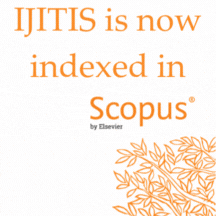Measuring the Knowledge and Attitudes of Healthcare Professionals Towards Telemedicine: A Step Towards Improving Medical Training
DOI:
https://doi.org/10.15157/IJITIS.2025.8.2.336-354Keywords:
Telemedicine, Knowledge, Attitudes, Medical Professionals, Healthcare SystemAbstract
Telemedicine leverages information and communication technologies for remote healthcare delivery, enhancing access to medical services, improving consultation efficiency, and coordinating care. In Morocco, its integration aims to optimise access to healthcare, especially in remote areas. To maximise the benefits, it is essential to train health professionals in telemedicine, which requires an assessment of their current knowledge and attitudes. This study aims to assess these aspects. This cross-sectional study engaged medical staff from the Faculty of Medicine, Pharmacy, and Dentistry and Hassan II University Hospital in Fez. Data were collected online using a standardized questionnaire covering socio-demographic and professional information, knowledge, experience, and satisfaction with telemedicine. Data analysis was conducted using SPSS V25, adhering to ethical standards of participant anonymity and data protection. Among 145 participants (mean age 24.99 years, 69.7% female), 95.8% were Moroccan, predominantly medical students (76.6%). While 81.7% were familiar with telemedicine concepts, 96.5% were unaware of public telemedicine programs in Morocco. Notably, 94.6% had never experienced a telemedicine consultation, though 46.8% supported its use for non-urgent cases. Most participants relied on the internet for information, with 90.9% unaware of existing regulations. Furthermore, 61% advocated for incorporating telemedicine into medical curricula, emphasizing its significance for future practice. Enhancing telemedicine knowledge and integration in Morocco's healthcare system is vital. Systematic training in medical education will prepare future professionals, improve healthcare access, and underscore the strategic importance of telemedicine in evolving healthcare practices.
Downloads
Published
How to Cite
Issue
Section
License
Copyright (c) 2025 Mohammed Omari, Noura Qarmiche, Hind Bourkhime, Moncef Maiouak, Nouhaila Charef, Soumaia Elghazi, Samira El Fakir, Nada Otmani

This work is licensed under a Creative Commons Attribution 4.0 International License.








